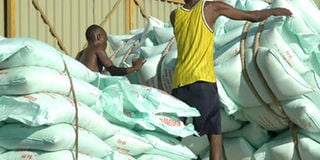Rwanda overtakes Kenya as Uganda’s biggest sugar export market in EAC

Workers load sugar at a factory
What you need to know:
- Over the years, Kenya has been the biggest importer of Uganda’s sugar but blockades and unilateral bans have disrupted trade between the two countries
Rwanda has overtaken Kenya as Uganda’s biggest sugar export market in the East African Community.
Data from Uganda Revenue Authority shows that in the nine months to September, Rwanda took 35.3 percent or 39.3 tonnes of sugar out of the 111.1 tonnes Uganda exported to the EAC Common Market.
However, available data indicates Uganda has not been exporting sugar to Kenya for some months now.
Mr Jim Kabeho, the Uganda Sugar Manufacturers Association chairman, told the East African that manufactures “have not been exporting to Kenya since July”.
Kenya recently announced a unilateral ban on imported sugar due to improved production capacity, but later indicated the ban could not apply to exporters within the EAC.
Rwanda depends on imported sugar to plug deficits and prices.
Import orders from Uganda have helped it to stabilise prices, which hit an all-time high of Shs5,381 ($1.47) per kilogramme in June, but have reduced to between Shs3,221 ($0.88) and Shs3,477 ($0.95) per kilogramme.
Kenya’s sugar imports from Uganda have sharply dropped, with EAC’s biggest economy, taking just 18 tonnes, representing 16. 2 percent in the nine months. Tanzania was the second largest importer of Uganda’s sugar, followed by South Sudan.
While Uganda can supply between 120,000 and 150,000 tonnes of sugar to Kenya annually, frequent policy reversals have hampered market access through restrictive permit issuance, and outright export bans.
Trade State Minister David Bahati, said last week government would continue to engage Kenya to allow seamless flow of sugar, but suggested a long-term solution, which would require manufacturers to add value to brown sugar.
The shift from selling brown sugar as a raw material to making industrial sugar for beverages and making ethanol to generate green energy is what Uganda is looking at to end the sugar trade wars.
“We are coming up with a regulation to allow power generated by sugar millers to be connected to the national grid,” Mr Bahati said.
Uganda’s biofuels sector is at its initial stage, but companies such as Kakira Sugar Works and Sugar Corporation of Uganda have installed capacity of 35,000 l and 60,000 l of molasses ethanol per day, respectively.
Scoul produces maize ethanol as well, while Kakira has started commercial production of ethanol.
Available information shows that Uganda has resumed exporting to Kenya after, in September, Andrew Karanja, the cabinet secretary for Agriculture said sugar from the Common Market for Eastern and Southern Africa and the East African Community had not been banned.
The ban was due to an improvement in domestic production that is projected to be producing 800,000 tonnes.
Kenya has an annual consumption of 950,000 tonnes, which Uganda had expected to tap into, but manufacturers have on several occasions been blocked.





